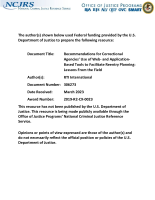Departments of corrections
Building Equity in Objective Prison Classification: A Model for Reducing Racial and Ethnic Disparities
California: A Decade of Decarceration
PRISONERS ON THE MOVE: EXAMINING THE NATURE AND EFFECTS OF PRISON TRANSIENCY ON INCARCERATED INDIVIDUALS
Meeting People Where They Are to Improve Institutional Culture
Incarcerated individuals deserve opportunities for healing and growth, but they often lack the necessary resources for such opportunities. Additionally, organizational cultures that don’t support these outcomes often stand in the way. Researchers and practitioners gathered at NIJ’s 2023 National Research Conference to share ideas and projects that will increase opportunities for incarcerated populations around the country. This show continues their conversation.
Changing Prison Culture Reduces Violence
Restoring Promise: A Randomized Control Trial Examining the Impact of an Innovative Young Adult Housing on Reducing Violence
Prison Contraband: Prevalence, Impacts, and Interdiction Strategies
Recommendations for Correctional Agencies’ Use of Web- and Application-Based Tools to Facilitate Reentry Planning: Lessons From the Field
NIJ’s Role Under the First Step Act
The First Step Act of 2018 (the Act) aims to reform the federal prison system and reduce recidivism.
NIJ plays a key role in major components of the Act and will assist the Attorney General in —
- Assessing the Federal Bureau of Prisons’ existing risk and needs assessment system.
- Developing and evaluating a...
Audio Analytics and Other Upgrades in Correctional Surveillance Systems
Optimizing surveillance systems in correctional settings
Defining Stress among Corrections Professionals
Assessing Drug Abuse Programs: Benefits From Partnering With Researchers
Partnerships for Public Safety
Keeping the Prison Clean: An Update on Pennsylvania's Drug Control Strategy
Taking Stock: An Overview of NIJ's Reentry Research Portfolio and Assessing the Impact of the Pandemic on Reentry Research
Over several decades, the National Institute of Justice (NIJ) has made significant contributions to the field of reentry, specifically what works for whom and when. In recent years, however, the global pandemic has made it increasingly difficult to conduct research on and with populations involved with the justice system. During this time, many researchers assessing various justice-related outcomes were unable to continue their inquiries as planned due to a lack of access to their populations of interest, forcing many to pivot and rethink their research designs.
See the YouTube Terms of Service and Google Privacy Policy
Desistance: It's a Process, Not an Event
The Interaction of Personal and Occupational Factors in the Suicide Deaths of Correction Officers
NIJ-Funded Research on Mass Shootings to Advance Evidence-Based Policy and Practice
Mass public shootings continue to threaten communities in the United States, yet research on this criminal phenomenon is limited. In this full thematic panel, renowned experts will present a series of research projects summarizing NIJ-funded research projects’ newest findings on public mass shootings. The discussion will focus on NIJ’s investment to address the phenomenon of mass shootings through innovative study approaches to advance our understanding of mass shootings and inform prevention efforts. The implications of this research to criminal justice will also be discussed.
See the YouTube Terms of Service and Google Privacy Policy
Desistance From Crime: Implications for Research, Policy, and Practice
Most scholars would agree that desistance from crime – the process of ceasing engagement in criminal activities – is normative. However, there is variability in the literature regarding the definition and measurement of desistance, the signals of desistance, the age at which desistance begins, and the underlying mechanisms that lead to desistance. Even with considerable advances in the theoretical understanding of desistance from crime, there remain critical gaps between research and the application of that research to practice.
See the YouTube Terms of Service and Google Privacy Policy





